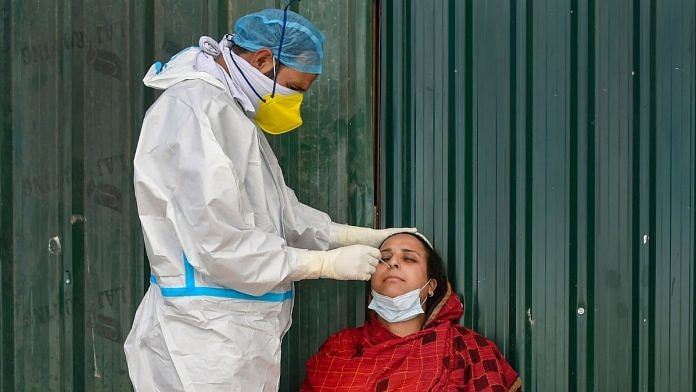New Delhi: Researchers in the US have found that people with mild to moderate Covid-19 infection produce “robust” antibodies that can last for at least three months, with only a slight drop in antibody levels by the fifth month.
“Our data reveal that individuals who have recovered from mild Covid-19 experience relatively robust antibody responses to the spike which correlate significantly with neutralization of authentic SARS-CoV-2 virus,” said the study which was published in the Science magazine Wednesday.
It added: “Although this cannot provide conclusive evidence that these antibody responses protect from reinfection, we believe it is very likely that they will decrease the odds ratio of reinfection, and may attenuate disease in the case of breakthrough infection.”
Also read: Behind Covid curve or tropical boon? India sees declining cases as US & Europe see surge
The study
Scientists from the Mount Sinai Health Systems in New York City screened 72,401 Covid-19 positive or suspected patients for antibodies, using the Mount Sinai ELISA (enzyme-linked immunosorbent assay) test. ELISA is an antibody test to detect the virus’ spike protein which enables it to attach and gain entry into human cells.
These individuals were screened for convalescent plasma donation. An antibody titre (a measurement of how much antibody an organism has produced) of 1:80 yielded a positive result, while a titre of 1:320 was seen as fit for donation.
Of the 72,401 people screened, 30,082 tested positive and their titers were divided into low, moderate, and high levels. Titres of 1:80 and 1:160 were considered low, titres of 1:320 moderate, and titres of 1:960 and ≥1:2880 considered high.
The study found that 22.49 per cent had moderate levels of antibodies, and 70.39 per cent had antibody levels that were considered high. Only 7.12 per cent had titres between 1:80 and 1:160, considered low.
“Thus, the rate of individuals who do not seroconvert (development of detectable antibodies in the blood) after SARS-CoV-2 infection is low, although such individuals may exist, and the majority of responders mount titers of 1:320 or higher,” said the study.
To determine longevity of antibodies, 121 donors were called back twice after their initial screening, which took place approximately 30 days after the onset of their Covid-19 symptoms. They were called back a second time 82 days after symptom onset, and then again at 148 days after symptom onset.
“When we compared overall titers, we observed a slight drop from a geometric mean titer (GMT) of 764 to a GMT of 690 from the first to the second time point and another drop to a GMT of 404 for the last time point. In the higher titer range of 1:2880 and 1:960, we also observed a slow decline in titer over time,” said the study.
It also said, “Surprisingly, but in agreement with earlier observations from our group that seroconversion in mild Covid-19 cases might take longer time to mount, we saw an initial increase in individuals who had an initial titer of 1:320, 1:160, or 1:80.”
This increase, the study added, later fell to the 30-day antibody levels after day 148.
What other studies have said
An earlier study had found that antibody levels in Covid-19 patients fell to undetectable levels after two to three months.
But the Mount Sinai study said, “…the antibodies measured in that paper targeted the NP (neucleo protein) plus a single linear spike epitope. The same paper also reported relatively stable (slightly declining) neutralizing antibody titers, which shows much higher concordance with our present findings.”
“It is still unclear if infection with SARS-CoV-2 in humans protects from reinfection and for how long,” said the new study, adding that it has found “stable antibody titers over a period of at least three months and only modest declines at the five-month time point. We plan to follow this cohort over longer intervals of time.”
It concluded, “We believe it is imperative to swiftly perform studies to investigate and establish a correlate of protection from infection with SARS-CoV-2.”
Also read: Regeneron Covid antibody therapy reduces viral load, need for medical care, trial suggests



